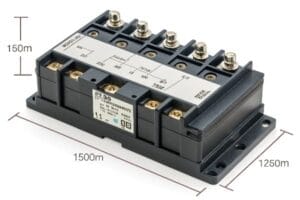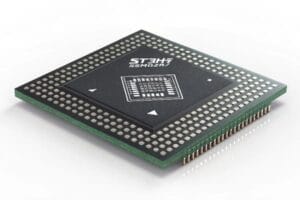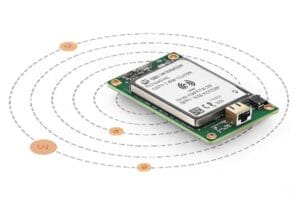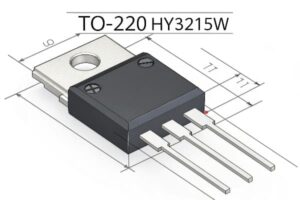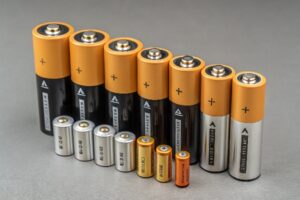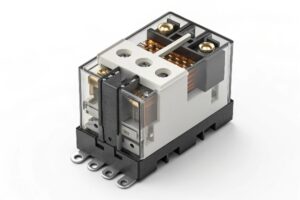How to find the right one for meter-level accuracy in BeiDou ?
Need precise location data? Selecting the right BeiDou module can be tricky. Let’s find the right one for meter-level accuracy.
To choose a part number for a single BeiDou dual-frequency positioning module with meter-level accuracy, look for modules that support dual-frequency reception (L1/L2 or B1/B2) and have a positioning accuracy specification of ≤1 meter CEP (Circular Error Probable). The MinewSemi ME3BGR02/ME3BGR11 Module with the China’s ZTE Micro AT9880B chip is a good example.
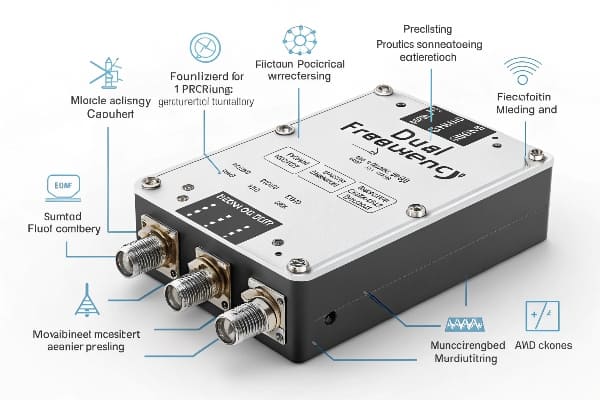
Getting centimeter-level accuracy can improve everything from new electric vehicles to precision agriculture. But finding the right part number requires understanding key features.
What is the Most Accurate GPS Device?
Are you looking for the highest possible accuracy in GPS? Technology keeps advancing, and accuracy is always improving.
The most accurate GPS devices are typically those that use Real-Time Kinematic (RTK) or Precise Point Positioning (PPP) technologies. These can achieve centimeter-level accuracy. However, single BeiDou dual-frequency modules offer meter-level accuracy, balancing cost and performance for applications that don’t require extreme precision.
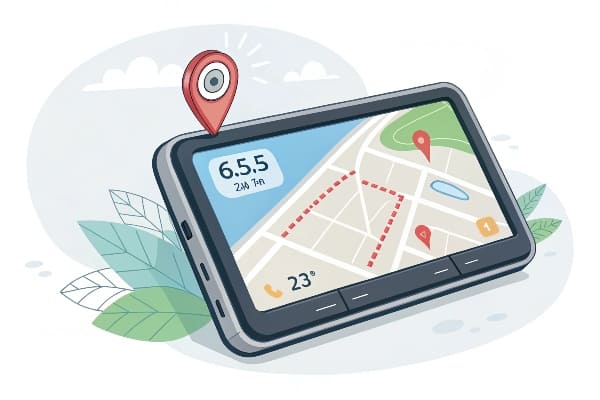
Most Accurate GPS Device
While RTK and PPP offer amazing accuracy, they also come with their own set of challenges. Let’s see what matters most when thinking about highly accurate GPS.
RTK vs. PPP
| Feature | RTK (Real-Time Kinematic) | PPP (Precise Point Positioning) |
|---|---|---|
| Accuracy | Centimeter-level | Centimeter to decimeter-level |
| Requirements | Requires a base station or network connection | Needs precise satellite orbit and clock information |
| Real-time | Yes | Yes, but can be slower to converge |
| Cost | Higher (base station, network fees) | Lower (no base station needed) |
| Applications | Surveying, precision agriculture, construction | Geodetic monitoring, scientific research |
The Rise of BeiDou
China’s BeiDou Navigation Satellite System (BDS) offers an alternative to GPS. Modern BeiDou systems use dual-frequency signals and advanced processing techniques. This helps them get very good accuracy. The MinewSemi #ME3BGR02/ME3BGR11 Module is a solid option. The China’s ZTE Micro AT9880B Chip is fully compliant with the #New National Standard for Electric Vehicles. This is the level of specificity you should look for when selecting a part.
How Accurate is a 1 Meter GPS?
Do you need good accuracy without breaking the bank? 1-meter GPS can be just the ticket for many applications.
A 1-meter GPS provides positioning accuracy within a 1-meter radius of the true location. This level of accuracy is suitable for various applications such as asset tracking, fleet management, and location-based services where precise positioning is not critical.
![]()
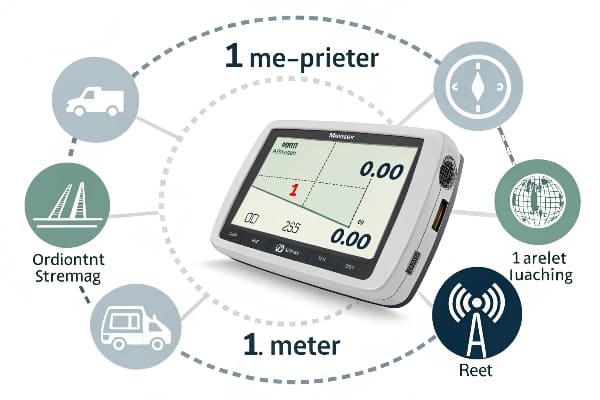
1 Meter GPS Accuracy
Meter-level accuracy offers a sweet spot between cost and usefulness. But to truly understand it, we need to look at real-world factors that affect performance.
Factors Affecting Accuracy
Several things can impact how accurate a GPS module is:
- Atmospheric conditions: Changes in the ionosphere and troposphere can affect signal travel time.
- Satellite geometry: The position of satellites in the sky affects accuracy. A wide spread of satellites is better.
- Multipath errors: Signals bouncing off buildings and other objects can cause errors.
- Receiver quality: Better receivers can process signals more accurately.
The MinewSemi module tackles some of these problems. It has built-in fast star search technology. This gives precise positioning even in tough urban areas.
When is 1-Meter Accuracy Enough?
1-meter accuracy is often good enough for:
- Fleet tracking: Knowing the general location of vehicles.
- Asset tracking: Keeping track of valuable equipment.
- Location-based services: Apps that need to know your general area.
- Electric Vehicles: Complying with the #New National Standard for Electric Vehicles.
How Accurate is a GPS Module?
Are you wondering about the general accuracy you can expect from a GPS module? It can vary quite a bit depending on the technology and conditions.
The accuracy of a GPS module varies depending on factors such as the type of module, signal strength, and environmental conditions. Standard GPS modules typically offer accuracy in the range of 3 to 10 meters, while more advanced modules with differential GPS (DGPS) or assisted GPS (A-GPS) can achieve accuracy of 1 meter or less.
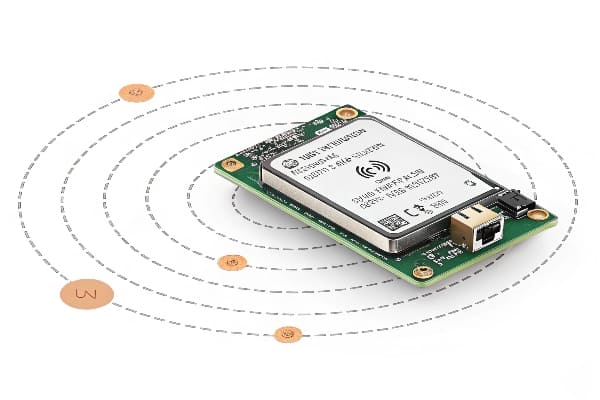
GPS Module Accuracy Range
Many different factors come together to affect GPS module accuracy. If you understand these, it’s easier to choose the right module for your project.
Types of GPS Modules
There are several types of GPS modules, each with different accuracy levels:
| Module Type | Accuracy | Features | Applications |
|---|---|---|---|
| Standard GPS | 3-10 meters | Basic positioning | Navigation, basic tracking |
| DGPS | 1-3 meters | Uses ground-based reference stations | Surveying, agriculture |
| A-GPS | 1-5 meters | Uses cellular network data for faster lock times | Smartphone navigation, fitness trackers |
| Dual-Frequency | ≤1 meter | Uses two frequencies for better accuracy | Precision agriculture, advanced asset tracking |
Getting Better Accuracy
If you need better accuracy, here are some tips:
- Use a module with DGPS or A-GPS.
- Make sure the module has a clear view of the sky.
- Avoid areas with tall buildings or dense trees.
- Use a high-quality antenna.
For precise positioning in challenging areas, the ME3BGR11’s exclusive A-BDS assisted positioning really helps.
How Accurate are GPS Coordinates?
Do you ever wonder how reliable the GPS coordinates on your phone really are? Let’s take a look.
The accuracy of GPS coordinates depends on many things, including the GPS receiver, satellite signals, and the environment. In open-sky conditions, a typical GPS receiver can give you coordinates that are accurate to within 3-5 meters. But, things like buildings, trees, and weather can make it less accurate.
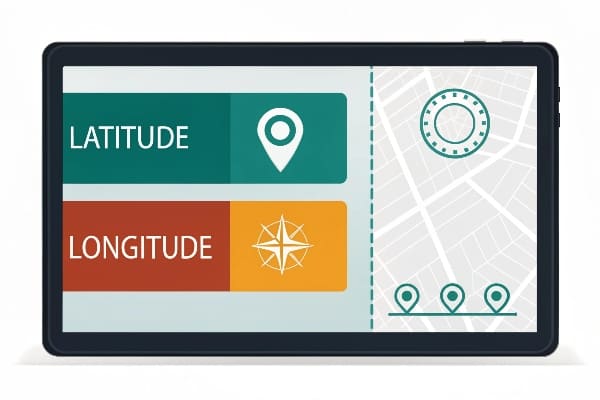
Understanding the different things that affect GPS coordinates can help you use location data more effectively. It can also help you choose the best equipment for your project.
Sources of Error
Several factors can cause GPS coordinates to be off:
- Atmospheric Interference: The atmosphere can change the speed of GPS signals, leading to errors.
- Signal Obstructions: Tall buildings and trees can block or weaken GPS signals.
- Multipath Effect: GPS signals can bounce off surfaces, causing the receiver to get mixed signals.
- Satellite Position: The arrangement of satellites in the sky can affect accuracy.
- Receiver Quality: Better GPS receivers use advanced tech to reduce errors.
Improving Accuracy
Here are some ways to improve GPS coordinate accuracy:
- Use Differential GPS (DGPS): This tech uses ground stations to correct GPS errors.
- Use Assisted GPS (A-GPS): This tech uses cellular data to improve GPS performance.
- Use Real-Time Kinematic (RTK): This tech provides centimeter-level accuracy, but needs a base station.
- Choose a Dual-Frequency Module: Like the MinewSemi #ME3BGR02/ME3BGR11 Module for improved data.
Conclusion
Choosing the right BeiDou module means balancing accuracy, cost, and your project’s needs. Look for dual-frequency support and meter-level accuracy. And consider the MinewSemi ME3BGR02/ME3BGR11 for reliable performance.

